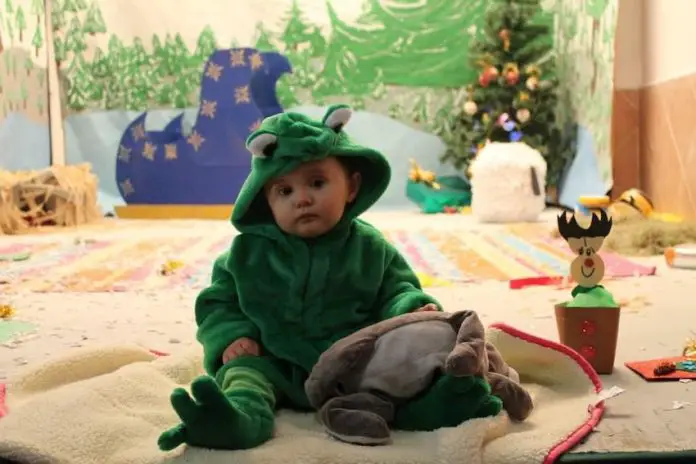Today, I pick up my 10-year-old daughter Lisa from her dad’s, and I’m excited. I miss her. Our conviviencia (custody) schedule means we each get her for half the week and divvy up holidays. While having those days to basically be a childless adult helps me get a lot of work done, I miss having her around. She’s my heart. Raising a Mexican-American child is quite common in the U.S., but what about raising an American-Mexican kid in Mexico? Well, it’s a whole different adventure.
Like any proud mom, I talk about my kid a lot. And like any tired sociologist, I talk about the difficult circumstances surrounding motherhood a lot. Work is not a walk in the park, and stereotypes paired with impossible standards make it easy to feel judged and insufficient.
![]()
But that’s motherhood everywhere, right? At least here, the figure of the mother is revered.
Mi chiquitita
Lisa was born here in Xalapa, in a private hospital. She has always lived in Mexico, though we travel to the US once a year or so to visit family. She is fully bilingual and doesn’t have an accent in either language.
The beginning wasn’t easy. Are any births easy? Ours seemed like an especially close call, though: she came a month early through an emergency cesarean section in which we both made it out alive by the skin of our respective teeth. She was very tiny, but thankfully, she was otherwise healthy.
![]()
After she was born, I had a lot of help. This is good, because I had to keep working part-time even though I had an infant. I worked online then, and did not have benefits. Sadly for all of us, she was an incredibly unhappy baby. She cried constantly and hardly slept. “Colic,” her pediatrician said.
We’d go home with special diets for me and little gotas (medicine to be administered in drops) for her tummy. The only thing that really helped, though, was growing up. She started speaking in both languages after her first year, and the more she could communicate, the happier she seemed.
My own theory is that she’s an old, old soul. Sure she was on the verge of Nirvana, she was instead born again. I’d be pissed, too.
Los Amiguitos
![]()
In the end, she did grow up, and she did stop crying. She made friends. Then the pandemic came and she was fairly isolated, like most of her peers, from about age six to eight. She made friends again, but awkwardly, like most kids did after not hanging out with each other for so long.
She loved both sides of her family, even though she only saw the U.S. side once in a while.
All of her friendships here, of course, have been and continue to be in Spanish. But when she tells me about her friends, it’s always in English. We’ve only ever spoken English together, even if we’re with other people. This doesn’t mean we have long conversations in front of others, of course. “Please take your plate to the sink.” “Where are your shoes?” That kind of thing.
When she’s with several children, often at my house, I’ll speak in Spanish if I need to give everyone instructions. I won’t lie, I don’t think any of her friends think of me as a “fun mom.” I’m strict and worry about them running on the stairs, and her closest friends have gotten used to my mini-lectures about safety.
I also cannot stand the loud, screechy yelling. I swear that wasn’t a thing” when I was a kid! Lisa doesn’t do it because I nipped it in the bud the first time she tried, but her friends? Well, they get lectured about it by their friend’s mom with a weird accent. And if there’s anything a kid loves, it’s a lecture.
But as long as I don’t scold her in front of anyone, she doesn’t seem embarrassed to communicate with me in front of others.
When we go to the U.S., making friends with other kids is slightly more awkward. Though her English is perfect, it took her a while to get used to how other kids spoke English. For a while, she must have thought English was a language only spoken by her and the adults in her family.
A little different
Though she’s lived here her whole life, it’s clear that she feels different than the other kids. But Lisa has something that actually does make her different: a foreign mother and an extra language spoken at home.
She’s a little shy, and she doesn’t like receiving too much attention; public speaking terrifies her, but she’s really good at it. I often wonder about this. Is she shy because she feels different, or is it simply her temperament? Or could it just be an extended kind of stage-fright that she’ll get over with age?
In any case, being shy is too bad because attention is just what she gets. She’s very pretty — takes after her mother, naturally — and she’s developing an odd fashion sense as she makes her way into the tween years. Dark colors and bow ties rule her ideal wardrobe; I donated everything in “girl colors” long ago. I myself am very girly, and am making a point to reinforce the idea that femininity is not a synonym for weakness or superficiality.
So I don’t know if her serious personality is learned or innate. I don’t know the degree to which her feelings of being different are derived from being the daughter of a foreigner and of speaking a different language.
I don’t know if she will reject one or the other cultures when she’s older; I hope not.
She may feel different, but I’ve known no one here or there to reject her. She is loved and, thankfully, understood and accepted.
Sarah DeVries is a writer and translator based in Xalapa, Veracruz. She can be reached through her website, https://sarahedevries.substack.com/
